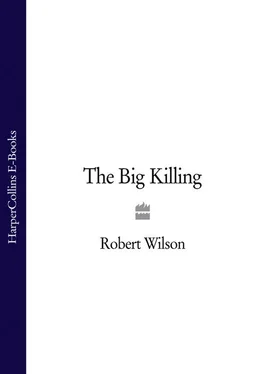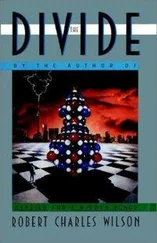I followed with the windows shut and the dust still finding its way into the car, mixed with the sweat streaming off my face and down my neck. I reached the gully and stopped. The car was too far ahead, and if I’d taken the gully at speed it would have put a kink in the chassis which might have been noticed. I sat back and watched the dust settle in a film over the dashboard and bonnet. A minibus passed from right to left driven by an African with white people in the back holding on to their seats. They were all wearing hats, which meant they were tourists, and they were hunched, grim and tense from a rough ride.
I should have turned right, driven back to the city, gone straight through Abidjan and out to Grand Bassam. I should have found Fat Paul sitting in some broken-down colonial house and given him his package along with some suggestions as to where, on his unchartered anatomy, he could stick it. I let the tourist bus get ahead and then turned left, following it at a distance down to the lagoon village of Tiegba.
Why did I do that, when the first of those snags I’d been on at Fat Paul about had just left a big rent in the threadbare fabric of my inner calm? Why, when Martin Fall was going to start paying me £300 a day plus expenses, did I carry on with a job that stank of disaster? Maybe my sense of honour needed a long stretch in a rehab centre to get itself realigned to cope with a modern world. Or was I just persuading myself that I was all confused with old-fashioned values handed down by well-meaning parents who would never understand the game.
I drove through the purpling afternoon and ran a film clip through my head which was clear as the day it had happened, twenty-two years ago. My father dying in a London hospital. The iron-grey light of a slate-cold, viral January – the month that saw off the parchment-skinned pensioners and people like my father with weak hearts and lungs black, clogged and bleeding from four decades of Woodbines and Capstans. His fingernails were blue, his grey and phlegmy eyes were frightened on either side of the black rubber oxygen mask which covered his dark lips. His hand dragged at the tube of the mask to pull it off and get it over with. The nurse chided him. He beckoned me over. I pulled the mask off a crack and heard the oxygen and then his voice like a radio on the other side of a windy railway track. ‘Never do anything for the money,’ he said to my sixteen-year-old innocence, ‘and if you say you’re going to do something, do it.’ Those were the last words of a London contract electrician; he survived the night but didn’t make it to mid-morning tea.
I’d taken this job for the money, so I’d failed him once. Now that I was following through with something I’d started would the old man be nodding his approval? I doubted it. I had an attitude problem, brought on by being alone too much, brought on by spending too much of my time with a bottle for company. One thing I did know was that I wasn’t confused. The truth was, I wanted to see if I could get away with it – tempt fate and still beat it. Maybe Heike was right to stay away from me.
No other cars passed on the other side of the road before I dropped down to the landing stage for the boats across to the stilted village of Tiegba. It was 5.30 p.m. by the time I parked up by the bar where the sound of elderly, annoyed Americans filled the air like frogs sending invitations after dark. Some of them were getting into low flat boats, filming their feet with video cameras while they did it. Most of the rest were climbing up the wooden stairs to the bar.
I asked the driver if he’d seen the last car to pass him on the road. He looked at me as if he’d had a bellyful of something that wasn’t food, and I was there to tread on his toes, while he patched up the inner tube of a tyre that wore its tread like a race memory. I left him to it and went up to the bar.
I nodded at a long-limbed guy slouched across a table. He nodded back. I washed in the two-man lavatory packed with seven desperate people jogging on the spot, their trainers squeaking on the tiled floor. The only things that were communicating were pacemakers and brand names.
‘The john don’t flush,’ said a weary voice from one of the cubicles. The room groaned. I got out of there.
I ordered a beer and sat at the old guy’s table. He introduced himself as Harold and told me about his trip, told me how many people had died on his trip, without my asking. I cut through it after five minutes and asked him if he’d seen the car. He said he had and that it was a dark saloon which was a big help – probably a Peugeot too, an even bigger help.
It was suddenly dark. Harold still hadn’t moved anything apart from his hat across his face. There was an intensity in the atmosphere, a stillness that meant that rain was charging down the coast towards us. Nobody spoke. A woman sighed and a man added a rattly cough –we could have been in the end ward of an old people’s home, the ward closest to the Chapel of Rest.
Lamplight flickered across the lagoon in the village. Low African voices coaxed the boats through the water. Toad-talk puckered the darkness and insects worked through the night. The air was stuffed into the room.
‘Gonna rain,’ said Harold.
The sprung fly-screen door whinged open and snapped shut. Harold’s hat stopped for a moment. A younger man in his early sixties came in and told them they were going to leave. They moved as one. Harold straightened and said something about not wanting to die on the premises and an old woman from the group chastised him. He looked through me over my shoulder, out of the slatted windows and mosquito netting into the dark.
‘I wouldn’t wanna die out here,’ he said, and then focused on me as if I was a candidate.
They filed out. Trousers hanging off bottoms with no buttocks, backs curved, forearms withered, breastless concave chests breathing shallow in the deep, thick air. The screen door slapped shut on the last of them.
I moved further into the bar and sat by the window which should have shown the lagoon or given at least the comfort of water lapping but showed only the grey haze of netting on black and the sound of air fizzing. The minibus moved off. A light breeze fanned off the water and guttered the candles on the tables. I had two more hours to kill.
The rain filled in the time. I helped it along with a few beers served by the barman who came from Sierra Leone and who demanded payment as soon as the bottle hit the table. He took the note and flattened it on the table, picking out any folds and creases and then folded it in half lengthways. He talked all the time, concentrating on his work and telling me he had left Sierra Leone because there was no work there and he reckoned the Liberian war was going to drift across the border and stir up trouble in the eastern part of his country where all the diamonds were.
‘They look for diamonds, buy guns,’ he said.
‘Where do they get the guns from?’
‘They have logs…timber…in Liberia, but no diamonds.’
‘But where do they get the guns from?’
‘On the east side, they have plenty wood. Fetch plenty money. You work in the logging camps?’
‘No. You?’
‘The guns,’ he said, and stopped. The fly screen slapped behind a policeman wearing a black plastic bin liner which he stripped off. He sat down and the barman served him a drink he didn’t pay for.
The rain roared. The water ran down the mosquito netting and the wind blew spray through it on to my face. It was good to breathe cool air with oxygen in it. The barman went behind his counter, the rain too loud for conversation. I felt the policeman’s eyes on me as I sipped the beer and replaced the glass on the same ring on the table top.
I was sharing Harold’s reluctance to die. His talk, the pointlessness of dying people touring the world when all they wanted to do was sit on the stoop sipping Diet Coke, had weakened my hands. I could barely pour the bottle, hardly grip the glass. The beer had soured my mouth and I began to think I was heading into something which if it didn’t finish me off might put some years on me in a single, compact, fear-loaded minute.
Читать дальше












